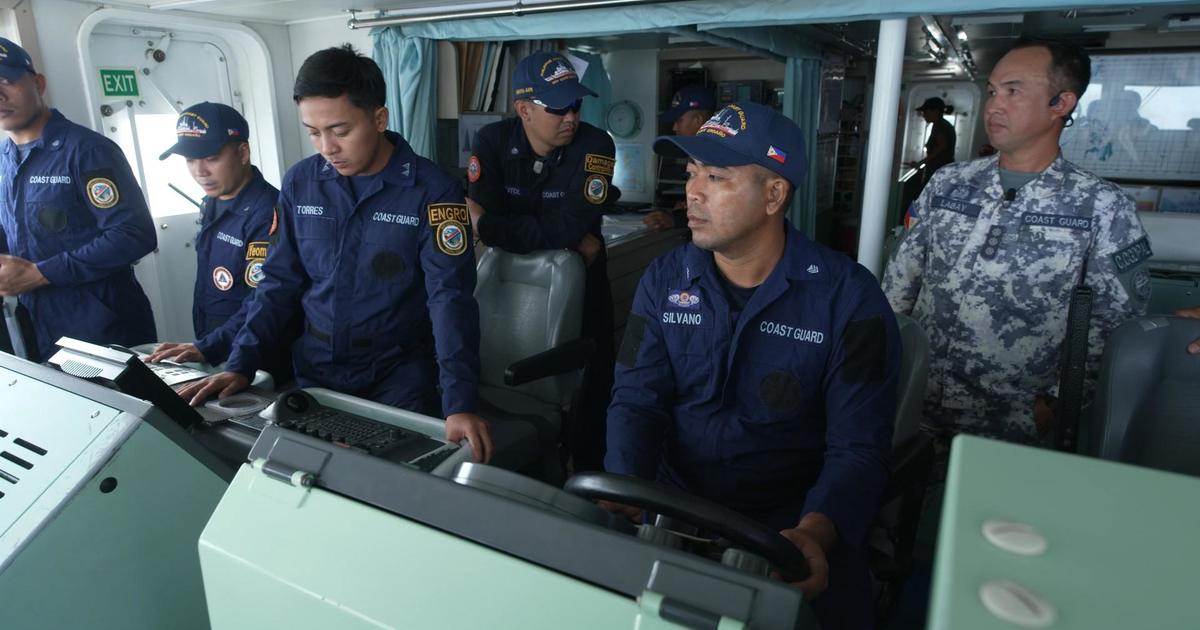An escalating series of clashes in the South China Sea between the Philippines and China could draw the U.S., which has a mutual defense treaty with the Philippines, into the conflict.
A 60 Minutes crew got a close look at the tense situation when traveling on a Philippine Coast Guard ship that was rammed by the Chinese Coast Guard.
China has repeatedly rammed Philippine ships and blasted them with water cannons over the last two years. There are ongoing conversations between Washington and Manila about which scenarios would trigger U.S. involvement, Philippine Secretary of National Defense Gilberto Teodoro said in an interview.
“I really don’t know the end state,” Teodoro said. “All I know is that we cannot let them get away with what they’re doing.”
China as “the proverbial schoolyard bully”
China claims sovereignty over almost all of the South China Sea, through which more than $3 trillion in goods flow annually. But in 2016, an international tribunal at the Hague ruled the Philippines has exclusive economic rights in a 200-mile zone that includes the area where the ship with the 60 Minutes team on board got rammed.
China does not recognize the international tribunal’s ruling.



deleted by creator
Care to explain what you mean by that?
Rule (of acquisition) 34 brah.
Just think of all that gold-pressed latinum…
deleted by creator
Except, China is not trying to expand its territorial waters “because capitalism”…
Chinas already fully capitalistic.
I’m aware…but it’s still not the reason they are attempting to expand their territorial waters…
deleted by creator
Why are they attempting to expand their territorial waters?
It’s about expanding their ability to project naval power in general, but more specifically, trying to to build effective defensive counters against potential future naval blockades and maritime containment e.g. Island Chain Strategy
That’s oversimplified, and there are other aspects to it, including domestic political cultural ones, but naval power and national security is the most significant.
I am not taking any position on justification, legal standing, or strategic prudence for this strategy.
There are any number of white papers, from both Chinese and American security organizations/think-tanks, that will cover the subject in much greater depth if you’re interested.
I’ve been saying for over a year that a much easier, and less politically suicidal, way for Xi to beat the island chain defense is to take back the Vladivostok oblast. It was part of China not even 150 years ago, there is a significant percentage, possibly even a plurality, of Han descended people, and it’s not like Russia is gonna have the army to stop a special military operation, or any allies to get upset about it.
Given Putin’s theory that nations comprise a set of territory they’ve historically held–Ukraine and Alaska being “rightfully” Russia’s–he surely wouldn’t object to China taking this part, right? And Kaliningrad goes back to Germany? He’ll be good with all that, right?
This does fail to mention the huge oil and gas reserves in the area that China is trying to capitalise on.
Resources are a bigger driver than military showmanship.
That sounds like a lot of words to say capitalism.
Are you saying that national security strategies, and war in general, didn’t appear in this world until capitalism emerged?
They’re probably saying war was only invented after there were enough resources in one place that the risk of going to war made sense.
Money is akin to resources, so yes…
And they’re right about it.
I’m saying that those stratigies are being executed to support their capitalist ambitions. You need freedom of the seas to ensure trade and they’re enhancing their power projection capabilities to ensure they’ll be free to continue trading in the event of forgein interfere.
It’s the exact same reason the United States enacts similar “national security strategies”.
Just “because nationalism”
Doesn’t mean it’s not profitable, though!